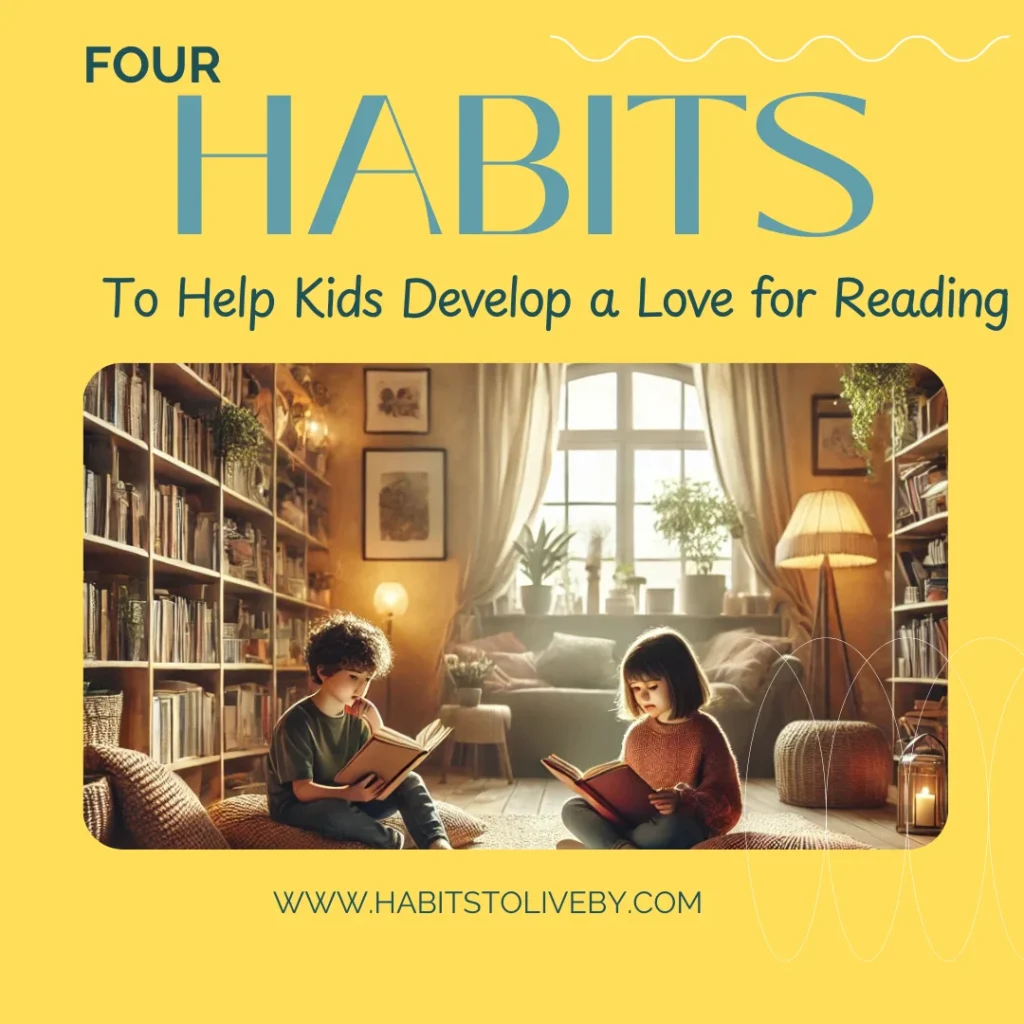In this digital era, dominated by screens and digital distractions, developing “the love for reading” in our kids can be challenging, but it is of utmost importance. Developing Habits to Help Kids Read is the best gift a parent or a teacher can give their children. Reading improves concentration, develops communication skills, enhances vocabulary, and is a gateway to imagination, creativity, and emotional intelligence. However, in this digital world, it is very challenging to keep kids away from smartphones, tablets, and video games.
Cultivating a love for reading doesn’t have to be an uphill task. Helping your kids adopt the right habits and strategies can inspire them to see books as a source of adventure and joy rather than a torturing chore. From creating a cozy reading environment to selecting books that align with their interests, small, intentional steps can make a big difference.
In this blog post, we’ll explore four practical Habits to Help Kids Read and develop a genuine love for reading. Whether you’re a parent, teacher, or caregiver, these tips will empower you to make reading a cherished part of a child’s daily life. Let’s dive into how you can transform young readers into lifelong book lovers.

Why is Reading Beneficial For Kids?
Children of all ages are observant; they follow what they see. When children see their favorite people taking time for reading, they observe and let this sink inside them, eventually developing a love for books and reading. With time, they learn that reading is engaging, interesting, valuable, and worth every minute.
Developing Habits to Help Kids Read offers numerous advantages that extend beyond academics. By fostering a reading culture, children improve their vocabulary, comprehension skills, and imagination. Here are some key benefits of encouraging kids to read regularly through effective Habits to Help Kids Read:
Creates a Love for Learning:
Reading as a habit creates a never-ending love for learning. Children who have this habit tend to explore and read more, enhancing their knowledge.
Improves Vocabulary:
Reading introduces children to new words, sentence structures, and expressions, helping them build a strong vocabulary and improve their communication skills.
Boosts Imagination and Sparks Curiosity:
Books spark curiosity and broaden imagination by transporting children to different worlds. Stories inspire children to use their imagination and think about different settings, characters, and events.
Helps Increase Attention Span and Focus:
Regular reading helps children develop patience and the ability to focus for extended periods, which benefits their academic performance and daily activities.
Develops Analytic Skills:
Reading challenges young minds, improving their comprehension, problem-solving, and critical thinking skills. It helps them analyze situations and make logical connections.

4 Habits to Help Kids Develop a Love for Reading
Let’s explore four habits that can help kids develop a love for reading. These actionable tips will help you create a reading-friendly environment for children.
1. Create a Reading-Friendly Environment
Why It Matters
Imagine studying in a noisy, cluttered room—it’s distracting, right? The same applies to children. A cozy and inviting reading space encourages kids to pick up and enjoy a book.
How to Set Up a Reading Nook
✔ Choose a Quiet Spot: Select a corner in your home where your child can read without distractions. This could be in their bedroom, a quiet corner in the living room, or even a small tent in the playroom.
✔ Make it Cozy and Comfortable: Add soft cushions, bean bags, and warm lighting to create a snug reading nook. To make the space feel magical, consider using fairy lights or a small lamp.
✔ Fill it with Books: Keep a variety of books within easy reach. Ensure that you include different genres—fairy tales, adventure stories, educational books, and even comics. The more choices they have, the more likely they find something they enjoy.
✔ Add Personal Touches: Let your child decorate the space with their favourite posters, stuffed animals, or other decorations. This will give them a sense of ownership and make the reading nook feel like their personal haven.
Pro Tip:
Change the books occasionally to keep things fresh and exciting. Rotating the selection keeps kids curious about what they might find next.

2. Make Reading a Daily Habit
Why It Matters
Children thrive on routine. Reading should be a daily habit, like brushing your teeth or eating meals. Making reading a regular part of their day helps them develop consistency and a sense of normalcy around books. The more they read, the more they associate it with relaxation and enjoyment.
How to Make Reading a Daily Habit
✔ Read Aloud Together: Even if your child is old enough to read independently, reading aloud together can be a special bonding time. It also helps improve listening skills and vocabulary.
✔ Set a Dedicated Reading Time: Choose a specific time each day for reading, such as before bedtime or after school. Consistency helps establish reading as a routine activity.
✔ Lead by Example: If your child sees you enjoying a book, they’re more likely to develop an interest in reading too. Make it a family activity where everyone sits together to read their books.
✔ Use Audiobooks and E-Readers: If your child isn’t a fan of traditional books, try audiobooks or e-readers. These options make reading more interactive and fun, especially for tech-savvy kids.
Pro Tip:
Create a reward system to keep kids motivated. For example, give them a sticker for every book they finish. Then, once they collect a certain number of stickers, they can choose a new book as a reward. This not only makes reading fun but also encourages consistency and excitement.

3. Choose Books That Match Their Interests
Why It Matters
Kids are more likely to read if the material interests them. If your child loves superheroes, giving them a book about space exploration might not capture their attention. By selecting books that align with their passions, you make reading enjoyable rather than a task.
How to Select the Right Books
✔ Follow Their Interests: Pay attention to what your child talks about or plays with the most. If they love animals, choose books about wildlife or pets. If they’re fascinated by magic, fantasy novels like Harry Potter might be the perfect choice.
✔ Introduce Different Genres: Don’t limit them to just one type of book. Please encouragePlease encourage them to explore fiction, non-fiction, mystery, adventure, humor, and graphic novels.
✔ Visit the Library or Bookstore Together: Allowing your child to pick their books empowers them and makes them more excited about reading.
✔ Use Recommendations: Ask teachers, librarians, or other parents for book suggestions based on your child’s age and reading level.
Popular Book Series for Kids
📚 Beginners: Elephant & Piggie by Mo Willems, a fun and easy-to-read series.
📚 Adventure Lovers: Percy Jackson & the Olympians by Rick Riordan, packed with mythology and excitement.
📚 Humor Fans: Diary of a Wimpy Kid by Jeff Kinney, a hilarious and relatable series.
Pro Tip:
If your child doesn’t like a book, don’t force them to finish it. The goal is cultivating a love for reading, not making it feel like homework.

4. Encourage Discussions About Books
Why It Matters
Discussing books not only helps children process what they’ve read but also enhances their comprehension, making reading a shared experience. Moreover, it helps them develop essential communication and critical thinking skills, which are valuable in all aspects of life.
Ways to Encourage Book Discussions
✔ Ask Thought-Provoking Questions: Instead of “Did you like it?”, ask open-ended questions like “What would you change about the story?” or “Which character did you relate to the most?”
✔ Start a Family Book Club: Read the same book together and discuss it weekly. This turns reading into a fun, social activity.
✔ Relate Books to Real Life: Make connections between the story and your child’s experiences. This helps them see the relevance of reading in everyday life.

Read more about habits 5 Healthy Winter Habits to Boost Your Immune System Naturally
Conclusion
Developing a love for reading in children is one of the most valuable gifts you can give them. You can transform reading from a chore into an adventure by creating a reading-friendly environment, making reading a daily habit, choosing books that resonate with their interests, and encouraging meaningful discussions.
Every child’s journey with reading is unique. Some may take to books naturally, while others may need more encouragement. The key is to make reading fun, relatable, and a part of their daily routine. With patience, creativity, and consistency, you can help your child discover the joy of reading and set them on a lifelong learning and imagination path.
What’s your child’s favorite book? Share in the contact us section!

